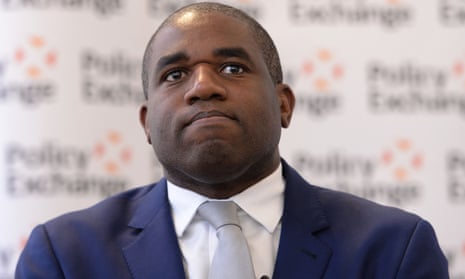David Lammy has written to the chair of the public inquiry into the Grenfell Tower fire to demand a two-stage investigation into the specific causes and circumstances of the blaze and its implications for national policy.
The Labour MP has also urged Sir Martin Moore-Bick to appoint an advisory panel of survivors, victims’ families and local residents “to boost confidence and trust in the inquiry”.
At a public meeting on the inquiry on Tuesday evening, residents repeatedly told Moore-Bick and his advisers that they did not reflect the local community. “You do not have our confidence, you do not represent us and you do not look like any of us,” said one woman, to cheers and clapping.
Since being appointed to chair the inquiry by Theresa May, Moore-Bick has struggled to win the confidence of local people. At Tuesday’s meeting, the retired judge, wearing a pinstripe suit, listened to people’s complaints and suggestions for more than two hours. At times he looked uncomfortable during more heated contributions, although he answered direct questions firmly.
Lammy’s letter, sent as part of the consultation process over the inquiry’s terms of reference, said the process needed “the confidence and trust of survivors and the victims’ families if it is to be legitimate and authoritative. It will be a difficult task to overcome the deep mistrust of authority that is felt within the community as a result of being let down by the state and by the authorities, and it is incumbent on the inquiry to convince the survivors and the Grenfell families that their voices will be heard and that the inquiry will do all in its power to uncover the truth.”
The Tottenham MP, whose friend Khadija Saye died in the fire, said the first stage of the inquiry should examine the cause of the fire and why it spread so quickly; preventative measures, such as fire alarms, fire doors and smoke-proofing “that were either not present or were ineffective”; and why residents’ concerns and complaints about fire safety and the condition of the tower were ignored.
It should also examine the policies of Kensington and Chelsea council in regard to social housing and the 2014 refurbishment of Grenfell Tower.
The fire brigades’ “stay put” policy, in which residents were advised to remain in their flats and await rescue, should be investigated. There should be scrutiny of the support and advice provided to those affected by the fire in the aftermath of the tragedy, Lammy said.
He said he hoped a first stage could be completed before the end of the year.
The inquiry’s second stage should address “systemic failure at a local and national level when it comes to the provision, management and administration of social housing in this country”.
The MP said: “A failure to learn the broader lessons of Grenfell would represent a grave injustice both in regards to the memories of those who died in Grenfell Tower and in putting other lives at risk.”
The second stage should examine the tragedy’s underlying causes. It should include the effectiveness and enforcement of building regulations; recommendations made after the Lakanal House fire in south London in 2009; the outsourcing and subcontracting of tenant management structures; and local authority and housing association funding.
Lammy urged Moore-Bick to “leave no stone unturned in identifying each and every individual and organisation who must bear responsibility and be held to account for this tragedy and its aftermath. Swift recommendations will help to ensure that there will be no repeat of this disaster.”
He ended his three-page letter by saying he had “experienced first-hand the grief, anger and frustration of the Grenfell survivors, victims’ families and community of north Kensington … This is a national tragedy with national consequences, and I wish you well in getting to the truth.”
The consultation period on the inquiry’s terms of reference ends on 4 August, although Moore-Bick told Tuesday’s meeting that he would hold “drop-in sessions” during the week beginning 7 August to allow residents to meet members of the inquiry team.
Moore-Bick expects to have the terms of reference agreed before the end of August, and to begin gathering evidence in September.
